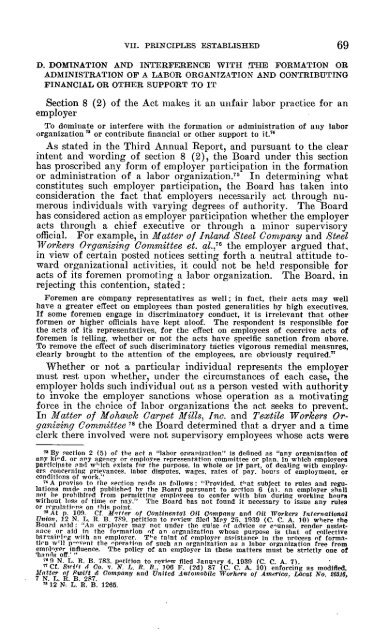J. - National Labor Relations Board
J. - National Labor Relations Board
J. - National Labor Relations Board
- No tags were found...
You also want an ePaper? Increase the reach of your titles
YUMPU automatically turns print PDFs into web optimized ePapers that Google loves.
VII. PRINCIPLES ESTABLISHED 69D. DOMINATION AND INTERFERENCE WITH THE FORMATION ORADMINISTRATION OF A LABOR ORGANIZATION AND CONTRIBUTINGFINANCIAL OR OTHER SUPPORT TO ITSection 8 (2) of the Act makes it an unfair labor practice for anemployerTo dominate or interfere with the formation or administration of any labororganization" or contribute financial or other support to it."As stated in the Third Annual Report, and pursuant to the clearintent and wording of section 8 (2), the <strong>Board</strong> under this sectionhas proscribed any form of employer participation in the formationor administration of a labor organization. 75 In determining whatconstitutes such employer participation, the <strong>Board</strong> has taken intoconsideration the fact that employers necessarily act through numerousindividuals with varying degrees of authority. The <strong>Board</strong>has considered action as employer participation whether the employeracts through a chief executive or through a minor supervisoryofficial. For example, in Matter of Inland Steel Company and SteelWorkers Organizing Committee et. al.," the employer argued that,in view of certain posted notices setting forth a neutral attitude towardorganizational activities, it could not be held responsible foracts of its foremen promoting a labor organization. The <strong>Board</strong>, inrejecting this contention, stated :Foremen are company representatives as well ; in fact, their acts may wellhave a greater effect on employees than posted generalities by high executives.If some foremen engage in discriminatory conduct, it is irrelevant that otherformen or higher officials have kept aloof. The respondent is responsible forthe acts of its representatives, for the effect on employees of coercive acts offoremen is telling, whether or not the acts have specific sanction from above.To remove the effect of such discriminatory tactics vigorous remedial measures,clearly brought to the attention of the employees, are obviously required."Whether or not a particular individual represents the employermust rest upon whether, under the circumstances of each case, theemployer holds such individual out as a person vested with authorityto invoke the employer sanctions whose operation as a motivatingforce in the choice of labor organizations the act seeks to prevent.In Matter of Mohawk Carpet Mills, Inc. and Textile Workers OrganizingCommittee 78 the <strong>Board</strong> determined that a dryer and a timeclerk there involved were not supervisory employees whose acts were73 By section 2 (5) of the act a "labor or ganization" is defined as "any or ganization ofany ki ed. or any agency or employee representation committee or plan. in which employeesparticipate and w h ich exists for the purpose. In whole or ill part, of dealing with employersconcerning grievances, labor disputes, wages, rates of pay, hours of employment, orconditions of work."ThA proviso to the section reads as follows: "Provided, t hat subject to rules and regulationsmade and published by the <strong>Board</strong> pursuant to seation 6 (a). an employer shallnot be prohibited from permitting emplo yees to confer with him during working hourswithout loss of time or nay." The <strong>Board</strong> has not found it necessary to issue any rulesor regulations on this point.At p. 109. Cf. Molter of Continental Oil Company and Oil Workers InternationalUnion, 12 N. L. R. B. 789. petition to review tiled May 25. 1939 (C. C. A. 10) where the<strong>Board</strong> said: "An employer may not under the guise of advice or c^unsel, render assistanceor aid in the fonnation of an organization whose purpose is that of collectivebargaining with an employer. T h e taint of employer assistance in the process of formatirnw'll p-'vent the operation of such an organization as a labor organization free fromemployer influence. The policy of an employer in these matters must be strictly one of'hands off.'76 9 N. L. R. B. 783. petition to review filed Januory 4, 1939 (C. C. A. 7).ri Cf. Thri ft 4 Co. v. N. L. R. B., 106 F. (2d) 87 (C. C. A. 10) enforcing as modified.Matter of Rwift f Company and United Automobile Workers of America , Local No. 26516,7 N. L. R. B. 287."12 N: L. R. B. 1265.
















